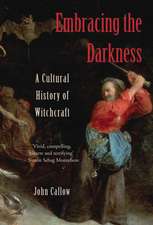Fear: Across the Disciplines
Editat de Jan Plamper, Benjamin Lazieren Limba Engleză Paperback – 30 dec 2012
This volume provides a cross-disciplinary examination of fear, that most unruly of our emotions, by offering a broad survey of the psychological, biological, and philosophical basis of fear in historical and contemporary contexts. The contributors, leading figures in clinical psychology, neuroscience, the social sciences, and the humanities, consider categories of intentionality, temporality, admixture, spectacle, and politics in evaluating conceptions of fear.
Individual chapters treat manifestations of fear in the mass panic of the stock market crash of 1929, as spectacle in warfare and in horror films, and as a political tool to justify security measures in the wake of terrorist acts. They also describe the biological and evolutionary roots of fear, fear as innate versus learned behavior in both humans and animals, and conceptions of human “passions” and their self-mastery from late antiquity to the early modern era. Additionally, the contributors examine theories of intentional and non-intentional reactivity, the process of fear-memory coding, and contemporary psychology’s emphasis on anxiety disorders.
Overall, the authors point to fear as a dense and variable web of responses to external and internal stimuli. Our thinking about these reactions is just as complex. In response, this volume opens a dialogue between science and the humanities to afford a more complete view of an emotion that has shaped human behavior since time immemorial.
Individual chapters treat manifestations of fear in the mass panic of the stock market crash of 1929, as spectacle in warfare and in horror films, and as a political tool to justify security measures in the wake of terrorist acts. They also describe the biological and evolutionary roots of fear, fear as innate versus learned behavior in both humans and animals, and conceptions of human “passions” and their self-mastery from late antiquity to the early modern era. Additionally, the contributors examine theories of intentional and non-intentional reactivity, the process of fear-memory coding, and contemporary psychology’s emphasis on anxiety disorders.
Overall, the authors point to fear as a dense and variable web of responses to external and internal stimuli. Our thinking about these reactions is just as complex. In response, this volume opens a dialogue between science and the humanities to afford a more complete view of an emotion that has shaped human behavior since time immemorial.
Preț: 386.45 lei
Nou
Puncte Express: 580
Preț estimativ în valută:
73.95€ • 77.40$ • 61.55£
73.95€ • 77.40$ • 61.55£
Carte tipărită la comandă
Livrare economică 31 martie-14 aprilie
Preluare comenzi: 021 569.72.76
Specificații
ISBN-13: 9780822962205
ISBN-10: 0822962209
Pagini: 240
Ilustrații: 12 Illustrations
Dimensiuni: 152 x 229 x 15 mm
Greutate: 0.38 kg
Ediția:1
Editura: University of Pittsburgh Press
Colecția University of Pittsburgh Press
ISBN-10: 0822962209
Pagini: 240
Ilustrații: 12 Illustrations
Dimensiuni: 152 x 229 x 15 mm
Greutate: 0.38 kg
Ediția:1
Editura: University of Pittsburgh Press
Colecția University of Pittsburgh Press
Recenzii
“Plamper and Lazier have rendered a major service by bringing this impressive set of contributions into conversation. Moving deftly from neuroscience and psychology to history and cinematography, they interrogate the scholarly, social, and political treatments of what is so often taken as the most hardwired of all emotions.”
—Michael Laffan, Princeton University
—Michael Laffan, Princeton University
“What a great book. It’s important for the sciences and humanities to interact, and this is a wonderful example, covering fear from many angles. I recommend it.”
—Joseph LeDoux, author of The Emotional Brain and Synaptic Self
—Joseph LeDoux, author of The Emotional Brain and Synaptic Self
“This is a book about how we have come to know what we think we know about the emotion of fear. The editors, Jan Plamper and Benjamin Lazier, argue that we remain, to some extent, trapped in a ‘phobic regime’ that we have inherited from the nineteenth century. It was then that fear came to be seen as an evolutionarily conditioned, politically manipulable phenomenon, not necessarily directed toward any specific threat; and, at the same time, as the most ancient and thus the most decisive of human emotions. . . . The book is cleverly organized so that later chapters often serve to historicize earlier ones, and the editors' introduction succeeds marvelously in placing the chapters in dialogue with each other. . . . a truly multidimensional appreciation of the historicity of fear.”
--Isis
--Isis
Notă biografică
Jan Plamper is professor of history at Goldsmiths, University of London. He is the author of The Stalin Cult: A Study in the Alchemy of Power.
Benjamin Lazier is associate professor of history and humanities at Reed College and the author of God Interrupted: Heresy and the European Imagination Between the World Wars.
Benjamin Lazier is associate professor of history and humanities at Reed College and the author of God Interrupted: Heresy and the European Imagination Between the World Wars.
Descriere
This volume provides a broad survey of the psychological, biological, and philosophical basis of fear in historical and contemporary contexts. The contributors, leading figures in clinical psychology, neuroscience, the social sciences, and the humanities consider categories of intentionality, temporality, admixture, spectacle, and politics in evaluating conceptions of fear. This volume opens a dialogue between science and the humanities to afford a more complete view of an emotion that has shaped human behavior since time immemorial.












